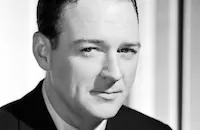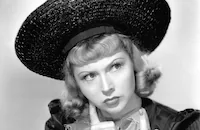She Asked for It
Cast & Crew
Erle C. Kenton
William Gargan
Orien Heyward
Vivienne Osborne
Richard Carle
Roland Drew
Film Details
Technical Specs

Synopsis
When his Uncle Norris' generous allowance is late, Dwight Stanford and his wife Penelope learn that he was killed in a hit-and-run accident and has left no will. By default, Norris' wealth goes to his son Conrad, even though Norris had favored his nephew. Dwight, a lover of murder mysteries, is now in need of an income, so he writes a series of stories, which prove to be hugely successful, featuring "amorous detective" Stephen Knight, whom his readers believe really exists. Soon Dwight runs out of ideas, however, and when he rejects his publishers' demands for more stories in favor of a fishing trip, his extravagant wife goes to Reno for a divorce. Dwight then discovers that a man named Jenkins has built a museum at Gramercy Place out of what he claims to be Stephen Knight's house. Dwight poses as the real Knight and forces Jenkins to rent the house to him, then leaks word to the press that the real Knight has returned from Africa and has placed an injunction against Dwight from writing another Knight mystery. Penelope, meanwhile, has gotten her divorce and has met Celia Stettin, who is enamored of Knight. Celia then hires Dwight, thinking he's Knight, to investigate a death threat that has been placed against her brother Randolph. She brings Penelope to the estate, where the grandfather falls to his death from a balcony. After Dwight tells the sheriff it was murder, he is nearly killed when his car is run off the road and burns. An old woman then picks him up and tells him the story of her wealthy sister's violent death, which gives Dwight the inspiration for his next novel. After Dwight is nearly gassed to death at the museum and barely escapes a typewriter bomb, he cogitates a murder syndicate of ex-racketeers employed by the wealthy to arrange fatal accidents for their hated relatives. Believing Knight is on to it, the syndicate has been trying to kill him. Dwight calls a meeting at Gramercy Place, which includes Celia, Randolph, Conrad, his lawyer Switch, Jenkins, the sheriff and Inspector Bacon. Framing all of them within the plot of his novel, Dwight implicates all but Celia in murder charges. Jenkins is accused of planting the typewriter bomb in order to keep Dwight from exposing the syndicate. In a panic, Conrad confesses to arranging the murder of his father, and the Stettins' Japanese houseboy, Kaito, who is now working for Dwight, holds Bacon at gunpoint and reveals that Bacon, hired by Conrad, was the driver of the car that killed Norris. Dwight now has the perfect ending to his novel. Penelope and Dwight, now reconciled, become the heirs to the Norris estate, but when they discover he was badly in debt, Dwight announces that Stephen Knight will ride again.

Director
Erle C. Kenton
Cast

William Gargan
Orien Heyward

Vivienne Osborne

Richard Carle
Roland Drew
Harry Beresford
Alan Birmingham
Harry Fleischmann

Tully Marshall
Miki Morita
Jeanne Lafayette

Joyce Compton
Carol Tevis
Frank Austin
Pat Flaherty
Hal Craig
Vesey O'davoren
Chester Clute
Edith Penn
Maidel Turner
Nick Thompson
Patsy O'byrne
Jack Clifford
William Burress
Nora Cecil
Edward Earle
Don Roberts
Oscar Smith
Crew
George Auerbach
Robert Bischoff
William Bridgehouse
Albert D'agostino
Jack Goodrich
Frederick Jackson
Leon Jaffe
Don D. Johnson
Boris Morros
George T. Nicoll
Theodore Reeves
B. P. Schulberg
Leon Shamroy
Howard Irving Young
Adolph Zukor

Film Details
Technical Specs

Quotes
Trivia
Notes
In early production charts, this film is called Accidents Will Happen, which was the title of character "Dwight Stanford's" novel at the end of the film. Production charts also state that the film was based on an original story by associate producer George Auerbach, although this has not been confirmed. This film marks the first starring role of former commercial artist's model Orien Heyward (although she previously had a bit part in the Paramount film Her Husband Lies, released March 19, 1937, see below). Motion Picture Herald remarked that Hayward was widely known by face by the readers of "smart" advertising.












